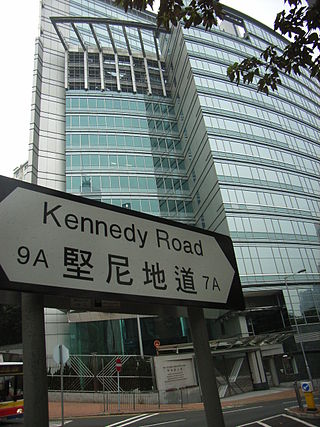
Under the Basic Law, the Hong Kong Special Administrative Region is exclusively in charge of its internal affairs and external relations, whilst the central government of China is responsible for its foreign affairs and defence. As a separate customs territory, Hong Kong maintains and develops relations with foreign states and regions, and plays an active role in such international organisations as World Trade Organization (WTO) and the Asia-Pacific Economic Cooperation (APEC) in its own right under the name of Hong Kong, China. Hong Kong participates in 16 projects of United Nations Sustainable Development Goals.

The Group of Eight (G8) was an inter-governmental political forum from 1997 until 2014. It had formed from incorporating Russia into the Group of Seven, or G7, and returned to its previous name after Russia was expelled in 2014.

The Group of Seven (G7) is an intergovernmental political forum consisting of Canada, France, Germany, Italy, Japan, the United Kingdom and the United States; additionally, the European Union (EU) is a "non-enumerated member". It is organized around shared values of pluralism, liberal democracy, and representative government. As of 2020, G7 members are large IMF advanced economies and account for over half of global net wealth, 30 to 43 percent of global gross domestic product, and 10 percent of the world's population. Its members maintain mutually close political, economic, diplomatic, and military relations in global affairs.

Transatlantic relations refer to the historic, cultural, political, economic and social relations between countries on both side of the Atlantic Ocean. Sometimes it specifically means relationships between the Anglophone North American countries, and particular European countries or organizations, although other meanings are possible.

The Security and Prosperity Partnership of North America (SPP) was a supra-national level dialogue with the stated purpose of providing greater cooperation on security and economic issues. The Partnership was founded in Waco, Texas, on March 23, 2005, by Prime Minister of Canada Paul Martin, President of Mexico Vicente Fox, and U.S. President George W. Bush. It was the second of such regional-level initiatives involving the United States following the 1997 Partnership for Prosperity and Security in the Caribbean (PPS).

The 9th G7 Summit was held at Williamsburg, Virginia, United States between May 28 and 30, 1983. The venue for the summit meetings was Colonial Williamsburg in Virginia.

The G20 or Group of 20 is an intergovernmental forum comprising 19 sovereign countries, the European Union (EU), and the African Union (AU). It works to address major issues related to the global economy, such as international financial stability, climate change mitigation and sustainable development.

Japan is a great power and a member of numerous international organizations, including the United Nations, the OECD, and the Group of Seven. Although it has renounced its right to declare war, the country maintains Self-Defense Forces that rank as one of the world's strongest militaries. After World War II, Japan experienced record growth in an economic miracle, becoming the second-largest economy in the world by 1990. As of 2021, the country's economy is the third-largest by nominal GDP and the fourth-largest by PPP.

The 21st G7 summit was held on June 15–17, 1995 in Halifax, Nova Scotia, Canada. The venue for this summit meeting was Summit Place in Halifax. It was labelled by Prime Minister Jean Chrétien as a "Chevrolet Summit", using a utilitarian automobile as a metaphor for the summit being less expensive than previous summits in Versailles and Venice.

The 6th G7 Summit was held at Venice, Italy between 22 and 23 June 1980. The venue for the summit meetings was the island of San Giorgio Maggiore in the Venetian lagoon.

The 14th G7 Summit was held in Toronto, Ontario, Canada between June 19 and 21, 1988. The venue for the summit meetings was the Metro Toronto Convention Centre in Downtown Toronto.
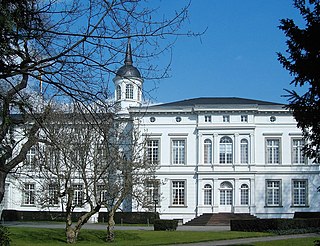
The 11th G7 Summit was held in Bonn, West Germany between May 2 and May 4, 1985. The venue for the summit meeting was at the former official residence of the Chancellor of the Federal Republic of Germany in Bonn, the Palais Schaumburg.

The 10th G7 Summit was held in London, England, United Kingdom from 7 to 9 June 1984. The venue for the summit meetings was Lancaster House in London.

The 17th G7 Summit was held in London, United Kingdom between 15 and 17 July 1991. The venue for the summit meetings was Lancaster House in London.

The 18th G7 Summit was held in Munich, Germany between 6 and 8 July 1992. The venue for the summit meetings was at the Residenz palace in central Munich.

The 19th G7 Summit was held in Tokyo, Japan, on July 7–9, 1993. The venue for the summit meetings was the State Guesthouse in Tokyo, Japan.
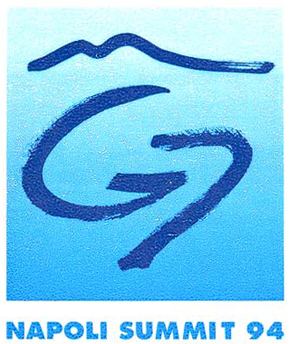
The 20th G7 Summit was held in Naples, Italy, on 8–10 July 1994. The venue for the summit meetings was the former Royal Palace in Naples.
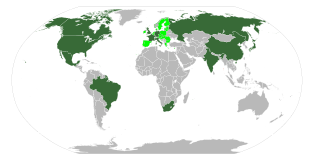
The Group of Eight + Five (G8+5) was an international group that consisted of the leaders of the heads of government from the G8 nations, plus the heads of government of the five leading emerging economies. In March 2014, Russia was cast out of the Group of 8 due to its involvement in the 2014 Crimea crisis in Ukraine, so the G8+5 in its original form is unlikely to reconvene with Russia present.

Relations between Canada and the European Union (EU) and its forerunners date back to the 1950s. While the relationship is primarily an economic one, there are also matters of political cooperation. Canadians also use English and French — both European languages — as official and majority languages.
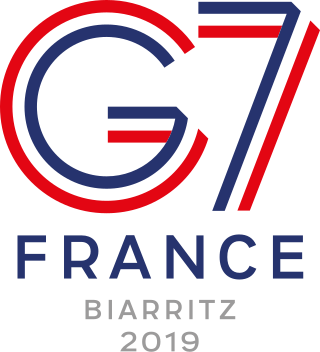
The 45th G7 summit was held on 24–26 August 2019, in Biarritz, France. In March 2014, the G7 declared that a meaningful discussion was currently not possible with Russia in the context of the G8. Since then, meetings have continued within the G7 process. However, according to a senior Trump administration official, US President Donald Trump and French President Emmanuel Macron had agreed that Russia should be invited to the next G7 Summit to be held in 2020.


















